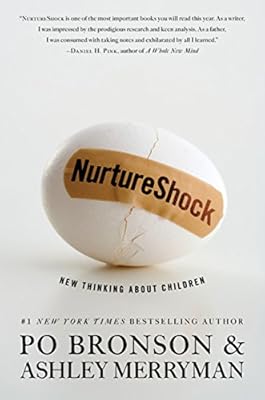📚 node [[nurtureshock]]
- Author:: [[Po Bronson, Ashley Merryman]]
- Full Title:: NurtureShock
- Category:: [[books]]

-
Highlights first synced by [[readwise]] [[September 2nd, 2020]]
- When they get to college, heavily-praised students commonly drop out of classes rather than suffer a mediocre grade, and they have a hard time picking a major—they’re afraid to commit to something because they’re afraid of not succeeding. (Location 267)
- The American mothers carefully avoided making negative comments. They remained fairly upbeat and positive with their child. The majority of the minutes were spent talking about something other than the testing at hand, such as what they might have for dinner. But the Chinese children were likely to hear, “You didn’t concentrate when doing it,” and “Let’s look over your test.” The majority of the break was spent discussing the test and its importance. (Location 296)
- “A person who grows up getting too frequent rewards will not have persistence, because they’ll quit when the rewards disappear.” (Location 320)
- “Sleep disorders can impair children’s IQ as much as lead (Location 412)
- exposure.” (Location 413)
- “Executive Function.” Among these executive functions are the orchestration of thoughts to fulfill a goal, prediction of outcomes, and perceiving consequences of actions. So [[Tired]] people have difficulty with impulse control, and their abstract goals like studying take a back seat to more entertaining diversions. (Location 425)
- The result is that sleep-deprived people fail to recall pleasant memories, yet recall gloomy memories just fine. (Location 443)
- Sleep loss increases the hormone ghrelin, which signals hunger, and decreases its metabolic opposite, leptin, which suppresses appetite. Sleep loss also elevates the stress hormone cortisol. Cortisol is lipogenic, meaning it stimulates your body to make fat. Human growth hormone is also disrupted. Normally secreted as a single big pulse at the beginning of sleep, growth hormone is essential for the breakdown of fat. (Location 519)
- All the studies point in the same direction: on average, children who sleep less are fatter than children who sleep more. (Location 524)
- “It’s a lot harder to enforce three rules than to set twenty rules.” (Location 1823)
- A few parents managed to live up to the stereotype of the oppressive parent, with lots of psychological intrusion, but those teens weren’t rebelling. They were obedient. And depressed. (Location 1832)
- The neuroscience of risk-taking is a very advanced field, but it doesn’t offer many solutions; some teens are wired to take big risks, done deal. The mechanics of this brain wiring include a reduction in the density of dopamine receptors, which makes teens unable to enjoy mild rewards, and a simultaneous spurt in oxytocin receptors, which makes them highly attuned to the opinions of their peers. Surrounded by friends, they’ll take stupid chances, just for the thrill. (Location 1903)
- That’s the teen brain at fifteen in a nutshell—fearless to jumping off roofs, but terrified of having its love of Nickelback exposed. (Location 1933)
- Really, to an adolescent, arguing is the opposite of lying. (Location 1937)
- “The popular image of the individual sulking in the wake of a family argument may be a more accurate portrayal of the emotional state of the parent, than the teenager,” (Location 2008)
- There is no evidence that bullying is actually on the increase, but the concern about its effects has skyrocketed. (Location 2460)
📖 stoas
- public document at doc.anagora.org/nurtureshock
- video call at meet.jit.si/nurtureshock
⥱ context
← back
(none)
(none)
↑ pushing here
(none)
(none)
↓ pulling this
(none)
(none)
🔎 full text search for 'nurtureshock'